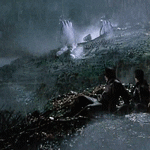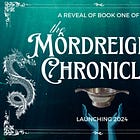The first instalment drops in two weeks from now (if we ignore the introductory post that signifies that the play is in progress). Is there someone you know who would love to read this?
It is a vibrant memory.
I’m in high school and while I don’t remember why my teacher used this example, my takeaway was this: always verify.
The example? War of the Worlds, the radio broadcast that sent a nation into a fearful frenzy, certain they were absolutely being attacked by aliens.
This was both the brilliance and the blowback to Orson Welles’ creation. It wasn’t announced as a radio play. And people took it seriously.
Sitting in the classroom in the late eighties, I couldn’t believe it. How could people be so dumb? I mean, it was so obvious it was all make believe.
It turns out it was the hysteria that was fake.1 However, the problem with stories that resonate, whether they are true or not, is that they stick with you.
For The Môrdreigiau Chronicles, I had the brilliant idea of making this newsletter/publication a little different from others that serialise fiction.
I thought — why not make the entire thing fictional? To make the entire thing a play (hence the fourth wall reference in the title).
This had started out as a junk journal idea, so I came up with a plan of finding the journal in the trunk and discovering its magical journal and sea dragons.
But because of that darned War of the Worlds story, I worried that someone might think it was all real: that I really did find a magic journal and sea dragons really do exist in gigantic magical form. That the sailors weren’t lying when they said, “Here be Dragons”.
OK, so now that I’ve said that aloud, it does sound a bit ridiculous. But this is why you see the disclaimer in the book trailer.
I’ve also put it in the upcoming introductory video, where I enter into the character of an artsy antiquer (yeah, not a big stretch) and find the journal. Which probably makes it the worst prologue ever.
The novel itself works just fine without these extra conceits, but it is fun filming reaction videos to the journal I made for this project.
Obviously, I don’t need that disclaimer. Those of you have been subscribers for a while know precisely what I’m up to.
But those who don’t? Well, now it is all tidily explained and I won’t be having to make apologies to the press like Orson Welles had to.
Turning it over to you — how do you feel about this newsletter becoming entirely fictional and not just sharing novel instalments?
“The Myth of the War of the Worlds Panic” by Jefferson Cooley & Michael, J, Socolow, Slate, https://slate.com/culture/2013/10/orson-welles-war-of-the-worlds-panic-myth-the-infamous-radio-broadcast-did-not-cause-a-nationwide-hysteria.html








I had a similar response when told the same story about the War of the Worlds broadcast, Leanne. Total incredulity. But, given some of the absolute super-charged BS that people believe these days, I now find the hysterical response story more believable now than I did as a child.
You also reminded me of the opening sequence of the Coen brothers’ movie Fargo, where a caption appears over the screen that says “this is based on a true story”. When an interviewer asked them about this they were incredulous. And said something along the lines of “of course it’s not a true story. From the moment the film starts rolling, we’re in the world of make believe.” I found that fascinating. Because some people DID believe it was a true story. So at what point in the narrative do we suspend our disbelief?
I’m not sure you can take responsibility for other people’s credulity. Where ever you put a disclaimer, some people will believe the whole thing to be truth. Others will roll their eyes at the idea anyone could believe any of it is true. But they’ll both enjoy the story.
I know when I first read Lord of the Rings as a child I loved the conceit that this was human pre-history that Tolkien had found, not so much invented. All his talk about how this part of the tale came from the Red Book of Westmarch, and the like, simply delighted me.
When you want to dive into a fantasy world, you don’t want the fourth wall broken. That’s for The Princess Bride, or National Lampoon’s Bored of the Rings.